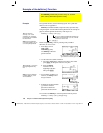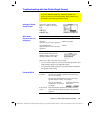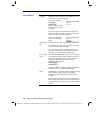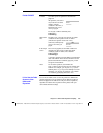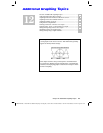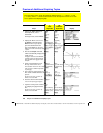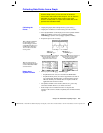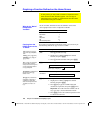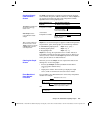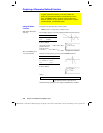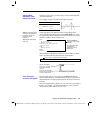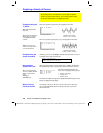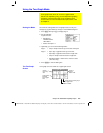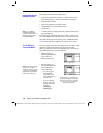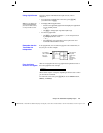
204 Chapter 12: Additional Graphing Topics
12ADDLGR.DOC TI-89/TI-92 Plus: Additional Graphing Tools (English) Susan Gullord Revised: 02/23/01 1:03 PM Printed: 02/23/01 2:15 PM Page 204 of 20
On the Y= Editor, all functions must be defined in terms of the
current graph mode’s “native” independent variable.
Graph Mode Native Independent Variable
Function x
Parametric t
Polar
q
Sequence n
3D x, y
Differential Equation t
If you have an expression on the Home screen, you can use any of
the following methods to copy it to the Y= Editor.
Method Description
Copy and
paste
1. Highlight the expression on the Home screen.
Press
ƒ
and select
5:Copy
.
2. Display the Y= Editor, highlight the desired
function, and press
¸
.
3. Press
ƒ
and select
6:Paste
. Then press
¸
.
§
Store the expression to a Y= function name.
2x^3+3x^2
ì
4x+12
!
y1(x)
Define
command
Define the expression as a user-defined Y= function.
Define y1(x)=2x^3+3x^2
ì
4x+12
2£
If the expression is already stored to a variable:
1. Display the Y= Editor, highlight the desired
function, and press
¸
.
2. Press
2
£
. Type the variable name that
contains the expression, and press
¸
twice.
Important:
To recall a function variable such as
f1(x)
, type only
f1
, not the full function name.
3. Press
¸
to save the recalled expression in the
Y= Editor’s function list.
Graphing a Function Defined on the Home Screen
In many cases, you may create a function or expression on the
Home screen and then decide to graph it. You can copy an
expression to the Y= Editor, or graph it directly from the Home
screen without using the Y= Editor.
What Is the “Native”
Independent
Variable?
Copying from the
Home Screen to the
Y= Editor
Tip
:
Instead of using
ƒ
5
or
ƒ
6
to copy and paste,
use:
TI
-
89
:
¥
6
or
¥
7
.
TI
-
92 Plus:
¥
C
(copy)
or
¥
V
(paste).
Tip: To copy an expression
from the Home screen’s
history area to the entry line,
use the auto-paste feature
or copy and paste.
Tip: Define is available fro
m
the Home screen’s
†
toolbar menu.
Tip:
2
£
is useful if an
expression is stored to a
variable or function that
does not correspond to the
Y= Editor, such as
a1
or
f1(x)
.
Use the complete function
name: y1(x), not just y1.



